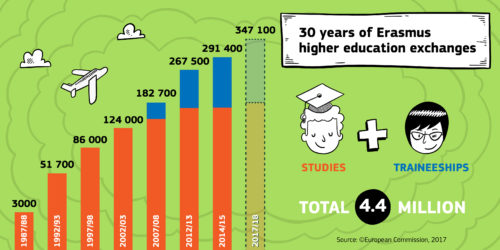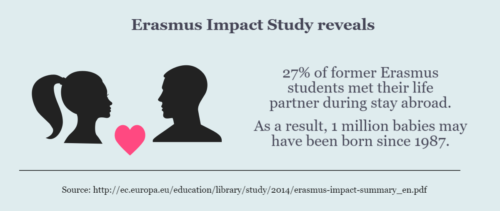Let there be Erasmus
30 years of European student exchange

There is a famous proverb in my home country, one of those that everyone uses from time to time. It is constructed as a rhyme and states that from birth to death, the best time to live is the student age. Although the original author probably referred to elementary and high school, especially as it dates back to my grandmother’s time, my personal experience confirms that it can be referred to the university period. An era that definitely will be remembered not only for academic studies per se, but also for the vibrant social life, which includes student exchanges and extracurricular activities.
If there is one particularly successful and positive story that the European Union can promote, then it is the well-known Erasmus student exchange, which has brought an opportunity to many young Europeans to experience how is it like to live and study in another European country. Hence, Erasmus is probably a word that brings a smile to the face of many young Europeans. This year marks the 30th anniversary of the programme, which is now a part of the whole Erasmus + platform, which consists not only of the academic exchange programme, but also of other educational opportunities for young people that are not enrolled in university studies, or people that have recently graduated. The Erasmus programme had a modest beginning in 1987, when only 11 countries and 3000 students participated. Nowadays, it spreads beyond the EU members, to a total of 33 countries and with an approximate number of 640 000 students annually profiting from the scheme.
I have personally benefitted from these programmes, with the experience fostering a strong sense of Europeanism in me, somewhat of a connection to the EU project. There are numerous examples of people traveling to a new country, meeting new friends or even finding the love of their life on these exchanges. I have met some couples that fell in love during these student exchanges. For instance, it was the only way for my friend from Eastern Europe to meet his girlfriend from Western Europe, while doing an Erasmus in Finland. From the last news I heard from them, they are still happily together, just like many other couples. It is also a strong tool to fight prejudice, stereotypes and ignorant behaviour that even nowadays is unfortunately well-spread.
What is also important is that Erasmus provides people with additional skills for the labour market and inspires young people to pursue their dreams. In other words, it increases employability. It is significant to mention that even the current EU officials, such as Federica Mogherini or Carlos Moedas, have also profited from the Erasmus student exchange. While I am not saying that every Erasmus student will become an EU Commissioner, I truly believe that every potential employer will be more than happy to see Erasmus written on one’s CV.

Therefore, it is encouraging that Commission President Jean-Claude Juncker recently stated that he will not accept any cuts to the programme, mentioning an apparently rumoured number of 1 million Erasmus babies, although I still do not know how this was calculated. But besides the love affairs, travels and new friendships between people from different countries, it is good to emphasize that at the end of the day, the programme encourages young people, makes them more employable and fosters their sense of being European. It shows that the EU is working for them, which then produces a strong basis for the future. I truly hope that the Erasmus programme will be a priority for the EU in years to come. To paraphrase the song from the recently deceased Malcolm Young of AC/DC – Let there be Erasmus!
